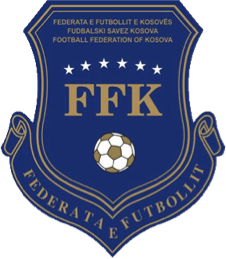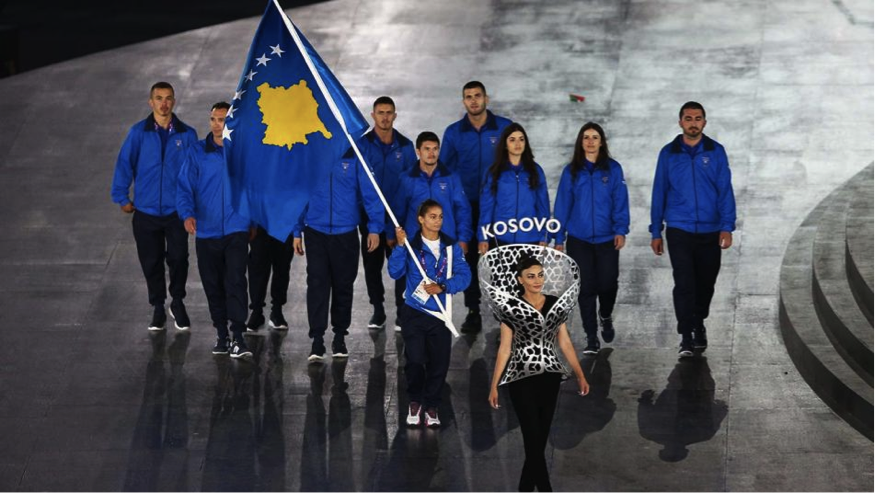Editor's Note: Ryan is Assistant
Professor at Thompson Rivers University, he defended his PhD at Erasmus
University Rotterdam in December 2015. His dissertation examined human rights
violations caused by international sporting events, and how international
sporting organisations may be held accountable for these violations.
“Serious sport…is
war minus the shooting.” – George Orwell
In May 2016, the
Union of European Football Associations (UEFA) admitted the Football
Federation of Kosovo (Kosovo) as a member. The voting was
close, with 28 member federations in favour, 24 opposed, and 2 whose votes were
declared invalid. The practical outcome of this decision is that Kosovo would
be able participate in the UEFA Euro championship, and that Kosovo teams could
qualify for the UEFA Champions’ League or Europa League.

A few days later,
Kosovo, along with Gibraltar, were admitted into the Fédération
Internationale de Football (FIFA) as members. This marked the
increasing recognition of Kosovo as an independent entity for sporting
purposes, with Kosovo’s National Olympic Committee receiving recognition from
the International
Olympic Committee (IOC) in December 2014.
The admission of Kosovo as an independent competitor in the sporting
world has touched off controversy, particularly in
Serbia. Kosovo has attempted to assert its independence from Serbia for more
than two decades, with a formal declaration of independence in 2008 – a
declaration that was referred to the International Court of Justice who found
that the declaration was not a violation of international law (I.C.J. Reports
2010, p. 403). The Football Federation of Serbia (Serbia) sought
review of UEFA’s decision, and took its case to the Court of Arbitration for
Sport (CAS). CAS upheld UEFA’s decision in January 2017 (CAS 2016/A/4602).
The CAS Decision
Serbia’s argument to the CAS was that UEFA violated its own regulations
by admitting Kosovo as a member. Other grounds, namely procedural grounds, and
an alleged violation of Serbia’s freedom of association rights, were raised.
However, the CAS denied Serbia relief on those grounds, and I’ll leave a
discussion of those aside in order to get to the decision on the substance of
UEFA’s regulations.
The main point of contention in the complaint was the interpretation of
the UEFA Statutes Art.
5(1), which deals with the admission of new members:
Membership of UEFA is open to national football associations situated in
the continent of Europe, based in a country which is recognised by the United
Nations as an independent state, and which are responsible for the organisation
and implementation of football-related matters in the territory of their
country.
The CAS panel found
this provision to be ambiguous based on the reality that the United Nations
does not recognise states. Instead, an entity must be a state to become a
member of the United Nations (UN Charter, Art.
4(1)). Since the part of the provision at issue, whether or not Kosovo could
be admitted since it was not “recognised by the United Nations as an
independent state”, was void, how was the provision to be interpreted?
The CAS turned to four principles of statutory interpretation, based on
the Swiss Civil Code: the genesis of
the law, a systematic interpretation, common practice and understanding, and
the ratio (purpose) of the provision. The CAS found the first three principles
to be unhelpful, as these principles ultimately uncovered elements that only
led to the ambiguity in the first place.
The CAS finally turned to the ratio of the provision. It found that the purpose
of the provision was to have one football federation per country, and to limit
secessions of football federations only to instances where the secession was
supported in a broader political sense. The CAS stated that: “the attempt to
mirror the solutions and realities of the political map onto the sporting world
makes a lot of sense” (para. 123). The panel also noted that the Olympic
Charter and FIFA Statutes defined a “country” as “an independent state
recognised by the international community”, and pointed out that Kosovo’s
sports bodies had been recognised by the IOC and other international sporting
federations under this definition. As a result, the CAS found that the
definition of “country” had a common understanding in the sporting community,
and it was one that did not require UN membership.
The Gibraltar Decision
Both UEFA’s decision, and the CAS case, have their roots in the late
1990s, but in regards to a territory on the other side of Europe – Gibraltar.
Gibraltar is not an independent state, but is a territory of the United
Kingdom. It is also a source of diplomatic conflict between the United Kingdom,
and Gibraltar’s neighbour – Spain. Gibraltar applied for UEFA membership in
1997. Having had its own football association since 1895, and with the UEFA
requirements then only requiring that a UEFA member have its own football
association that oversees football in the territory, Gibraltar’s application
looked to be a lock. Indeed, the application was initially positively received
by UEFA, and looked to be a done deal by the year 2000.
However, UEFA repeatedly delayed making a final determination, in part
because of Spanish opposition to Gibraltar’s membership (the English Football
Association, for its part, was supportive of Gibraltar). After more than two
years, UEFA still had not made a determination on Gibraltar’s membership. Yet,
they had received, processed, and approved an application by Kazakhstan to join
UEFA after it had left the Asian Football Confederation in 2001. UEFA remained
pretty busy during this time, as they changed their rules regarding the
admission of new members to UEFA. The new change was the language that was at
issue in the Kosovo case – that a new
member be recognised as an independent state by the United Nations.
The case was brought before the CAS (2002/O/410), where Gibraltar
sought a declaration that its application be considered under the pre-2001
rules that it had initially applied under, and that its application be accepted
by UEFA. The CAS agreed with Gibraltar that UEFA could not change its rules
mid-stream, finding that upholding such a change would violate a presumption against
retrospectivity in regards to substantive laws, and principles of good faith.
The CAS ordered UEFA to decide on Gibraltar’s membership based on the pre-2001
rules. After two more arbitrations heard by the CAS in 2006 and 2013, Gibraltar
was admitted as a UEFA member in 2013. Gibraltar’s status as a FIFA member was
similarly accomplished through CAS decisions.
Sport as a Playground for International Law
With all apologies to this blog’s Editor-in-Chief Antoine Duval, sport is not just a
playground for transnational law, but also for international
law. Scholars of international relations and international law are frequently
surprised with the complexity and the depth of sports’ legal system. But
perhaps more surprising is the consistent surprise that sports is more than
simply “low politics”, and something that can be safely ignored in light of
other areas such as military force, international trade, and the like.
I suggest that a case such as Kosovo’s quest for recognition by sporting
bodies does matter for international law and international relations more
generally. On the merits, these cases are administrative law exercises, whereby
the CAS is merely ensuring that UEFA has complied with its own procedures, and the
Kosovo case is a statutory
interpretation exercise. However, I think that these cases – particularly the Kosovo case, should help shape our
understanding of establishing a state.
There is a debate in international law over when a political entity
becomes a “state” – with the attendant rights and obligations. The
“constitutive” theory argues that an entity can only become a state when other
states recognize it. The “declaratory” theory argues that so long as certain
“facts on the ground” are established (usually the Montevideo Convention requirements of
territory, population, government, and the capacity to enter into foreign
relations), recognition is merely a declaration of what is already the case.
Kosovo is in the midst of attempting to establish its statehood.
Currently, 110 UN member states recognise Kosovo. However, Serbia, Russia, and
China, amongst others, do not. In establishing its statehood, Kosovo is
unlikely to obtain UN membership anytime soon, with two of the permanent
members of the Security Council likely to veto any attempt by Kosovo to join.
However, Kosovo appears to be taking a page from the playbook of states
that went through de-colonization – not only obtain a seat at the UN, but
obtain recognition from the IOC (and other sporting bodies). Next to having a
seat at the UN, participation in the Olympic Games is one of the most visible
signifiers of statehood. What could a more powerful signal of independence than
having one’s athletes march in the opening ceremonies of an Olympic Games,
waving the state’s flag, and having its anthem play upon winning a gold medal
in front of thousands of people live and billions of people watching from home?

Source: http://www.nbcolympics.com/news/judo-day-2-preview-majlinda-kelmendi-eyes-olympic-history.
If you are skeptical that states care about who participates in
international sporting events, Taiwan remains a prime example. Taiwan does not
compete as “Taiwan”, or as the “Republic of China” along with its national flag
– but instead its athletes compete under “Chinese Taipei”, using a different
flag with the Olympic Rings on it. This was as a result of a deal brokered by
the IOC and the People’s Republic of China in 1979 to get the People’s Republic
of China to participate in the Olympic Games – a deal eventually accepted by
Taiwan in 1981.
What cases like Chinese Taipei
and Kosovo suggest is that although
recognition is important in establishing statehood, it may not be limited to
state recognition. While states may be the only organisations that have
international legal personality, there are cracks forming in that monolithic
conceptualization of international law. It is clear that sporting organizations
such as the IOC, FIFA, and UEFA do not have international legal personality.
However, they act as global administrative bodies, responsible for the
organization of much of global sport. As such, these bodies have the reach and
arguably, influence of the UN bodies – creatures of states that have
international legal personality.
A real concern over constructing statehood through, inter alia sporting competition is that it may create a “slippery
slope”. After all, if Gibraltar – certainly not a state – and Kosovo –
questionably a state – can join UEFA, FIFA, or have a National Olympic
Committee recognized, what is to stop other entities from doing the same?
“Alternative” competitions involving entities that are not recognized as
states, such Northern Cyprus, or ethnic groups
such as the Sami of Scandinavia or the Romani of Europe, have taken place.
Could one of these entities apply to join the international sporting community?
The line-drawing by international sporting organisations has thus far proven to
be problematic. However, this is a question perhaps best left for future
research.
So, in the end, does the UEFA admission and CAS decision make Kosovo a
state? Legally-speaking, probably not. Becoming a state entails not only rights
at international law, but also obligations. It seems perhaps a stretch to say
that a decision by a private arbitral body that oversees a specialized area
would be determinative of a highly-contentious issue. However, one step below
that is the political question of whether recognition by these sporting bodies
helps Kosovo’s claims to statehood. I think the answer is as follows: If you
ask the “man on the street” whether Kosovo was a state as Majlinda Kelmendi (the
flag-bearer in the photo above) stood on the podium after winning a gold medal
in judo at the 2016 Summer Games, or while that man watches the Kosovo team
participate in the UEFA Euro and FIFA World Cups – that answer is more and more
likely to be “yes”.